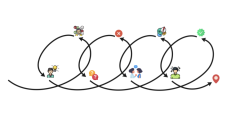Today I talked with a few friends about the Employment problem of art students. At first, I want to know why it’s hard for an art student to sell their artworks. I guess it’s because of some aesthetic differences between artists and audiences, or some artists don’t know how to communicate with the audience. After I talked with them, I change my mind.
1. Most people don’t choose this major because they love it.
“Why you chose a fine art major?”
A: “Because this major has the highest probability of being admitted.”
B: “I misunderstood the major, I thought it is another one.”
C: “Because I am curious about this major.”
D: “Because one of my teachers recommended this major.”
2. When they choose a major, they don’t think about their future employment.
“Before you chose this major, did you know the career direction of this major?”
A: “No.”
B: “No. Maybe could be an art teacher.”
C: “No, I have no idea about employment and the future.”
D: “I didn’t think about it myself. My parents did.”
3. Some people find it is not suitable for them after they chose it.
“Do you think this major is right for you?”
A: “It is not suitable for me. This major requires more carefulness, and I am a careless person.”
B: “Not very suitable for my current job. I am a UI designer now, and my major cannot help me.”
C: “In the process of learning, I found that I did not like this major. When I was about to graduate, I came into contact with some other design majors. I found that compared with pure art, I was more attracted to some majors that could realize my ideas in the form of products.”
D: I think it suits me, but I also want to try other majors which is more suitable for me.
4. Market problems VS Personal problems
“Why it’s hard for a fine art student to find a job? What’s your opinion?”
A: “Market problems. Few people are willing to buy a painting. If the price is too high, they won’t buy it. If the price is too low, you won’t sell it.”
B: “Supply exceeds demand. And the market is not perfect.”
C: “I think nowadays not many people have both exceptional talent, strong belief, and hard work. No matter what kind of style you paint, there is always someone who likes it. The difference is the number of people.”
D: “No fame, no sale, no appreciation. Art is a dispensable thing for a lot of people, and most people don’t spend money on a painting unless it’s given as a gift.”
“From your heart, what does drawing mean to you?”
A: Things I can do in my leisure time.
B: The meaning of painting for me is to express feelings. A good painting will have a sense of achievement, while a bad painting will make me unhappy. I like to draw, but I get tired of it if I paint every day. I only draw when I have an impulse. I haven’t painted since graduation.
C: the thing I want to do all my life.
D: Painting is a kind of expression. It is to express some ideas in the form of painting, just like speaking or writing an article
“When was the last time you drew a picture?”
A: “I haven’t done it in years.” (Pet Shop Owner)
B: “I haven’t painted since graduation.” (UI designer)
C: “Almost never after I graduation.” (Jewelry Design Learners)
D: “Last Tuesday.” (Fine art PhD)
Based on all of it, I think ‘personal problems’ is the main reason why it is hard for fine art students to support themselves with their talent. Most of them gave up and went on to do something else. Some of them think it’s market problems. However, I think that’s their excuse. It is easy for them to give up because they don’t really like their major, and they think it’s not suitable for them. It could be better if they can fully understand a major before they make a choice.
Maybe I can provide a platform to help these students fully understand the differences, the content, future development, and employment directions between different majors. For example, I can invite some experts in different majors to provide various workshops for these students.

